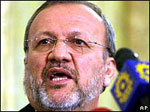 AFP: Iran said on Tuesday its barring of two nuclear inspectors serves as “notice” to the chief of the IAEA, but added Tehran was ready for talks with the UN atomic agency as suggested by France.
AFP: Iran said on Tuesday its barring of two nuclear inspectors serves as “notice” to the chief of the IAEA, but added Tehran was ready for talks with the UN atomic agency as suggested by France.
by Jay Deshmukh
 TEHRAN, June 22, 2010 (AFP) – Iran said on Tuesday its barring of two nuclear inspectors serves as “notice” to the chief of the IAEA, but added Tehran was ready for talks with the UN atomic agency as suggested by France.
TEHRAN, June 22, 2010 (AFP) – Iran said on Tuesday its barring of two nuclear inspectors serves as “notice” to the chief of the IAEA, but added Tehran was ready for talks with the UN atomic agency as suggested by France.
“This action (banning the inspectors from entering Iran) is in reality a regulatory notice to (Yukiya) Amano to be careful so that the agency’s inspectors do not violate the international entity’s charter,” the official news agency IRNA quoted Foreign Minister Manouchehr Mottaki as saying in a state television interview.
“Amano should manage the agency professionally,” he said, referring to the chief of the UN atomic body, the International Atomic Energy Agency (IAEA).
On Monday, Iran announced it was barring two IAEA inspectors from entering the country, accusing them of filing a “false report” and “leaking information” about Tehran’s nuclear programme which the West suspects masks a weapons drive.
The Islamic republic says its nuclear programme is purely for peaceful purposes.
Iran’s atomic chief Ali Akbar Salehi said that Tehran told the IAEA at its latest meeting that the inspectors had filed a “totally wrong report and the two be replaced with two other inspectors who can visit the country.”
Iran’s arch-foe Washington quickly criticised Tehran, saying the ban on the inspectors was “symptomatic of its longstanding practice of intimidating inspectors.”
“Reducing cooperation with the IAEA will only deepen the world’s concern with respect to its nuclear programme,” State Department spokesman Philip Crowley said in Washington.
The ban on inspectors came less than a fortnight after the UN Security Council imposed new sanctions against Iran after a resolution sponsored by the United States.
Top US lawmakers further pressured Iran on Monday as they reached a deal on a series of unilateral punitive measures against Tehran, separate from the UN sanctions.
The US legislation targets firms that provide Iran with refined petroleum products — like gasoline or jet fuel. Oil-rich Iran relies heavily on imports of petroleum products because of a lack of domestic refining capability.
It could also see non-US banks doing business with certain blacklisted Iranian entities — including Iran’s elite Revolutionary Guards and several banks — shut out of the US financial system, according to a summary.
The European Union too has imposed separate sanctions against Iran.
But French President Nicolas Sarkozy, whose government backed the UN sanctions, has offered to hold talks with Iran at the IAEA over its atomic programme, including a proposed nuclear fuel swap deal.
Mottaki, in the same state television interview, welcomed Sarkozy’s offer.
“We believe there are serious signs that France is willing to conduct an independent action,” Mottaki said.
“We see this approach as positive. If there are more serious signs of such a will then Europe can enter a new phase of playing a greater role” in resolving Iran’s nuclear issue, he said.
However, his ministry’s spokesman, Ramin Mehmanparast, said Sarkozy’s offer “contradicts” the stance of the French government of backing the UN sanctions.
Sarkozy told his Russian counterpart at a meeting in Saint Petersburg on Saturday that France was ready “without delay” to hold talks with Iran in Vienna where the IAEA is based.
He reportedly said that the talks can address the fuel swap deal brokered by Brazil and Turkey on May 17 and can also “restart negotiation between Iran and the six powers about the (overall) nuclear issue.”
Talks between Iran and the six world powers — Britain, France, Russia, China, the United States and Germany have been on the backburner since the fuel swap deal hit a deadlock.
The fuel deal, which is a counter proposal to last October’s plan drafted by the IAEA, envisages Tehran sending 1,200 kilograms of its low-enriched uranium to Turkey after which Iran would be supplied at a later date with 20 percent enriched uranium by Russia and France.
But this proposal has been cold-shouldered by the United States, France and Russia which have asked for further clarification.
Mehmanparast said Iran will “soon send its response” to their questions.


